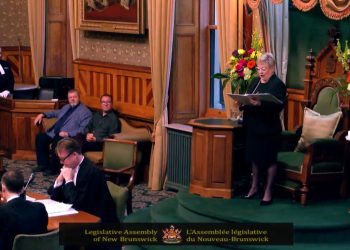On Oct. 22, the New Brunswick Labour and Employment Board declared a deadlock in negotiations between Canadian Union of Public Employees (CUPE) Local 1190 and the Province of New Brunswick.
The local represents about 2,000 general labour and trades workers across the province in eight government departments including Transportation, Tourism, and Parks.
The Board’s declaration of a deadlock opens the way for a strike vote by the union unless both parties inform the board by Oct. 29 that they want binding arbitration. The union includes the approximately 600 people who remove the snow from provincial highways. Unlike most of 1190’s members they are designated as essential and would not be allowed to strike.
CUPE communications representative Simon Ouellette says that the union has requested binding arbitration but that the province “probably won’t be interested in going into binding arbitration with 1190,” noting that the province rejected binding arbitration with nursing home workers earlier this year.
The Labour and Employment Board’s declaration of a deadlock comes four months after a conciliation board report in July which recommended three per cent annual wage increases for the Local 1190 workers for four years, and full pay for union members in the employer’s “casual employee” category, most of whom are currently paid only 80 per cent of the permanent employee rate.
Local 1190 President Brent Wiggins says the union accepts these and all of the other half-dozen or so recommendations in the report, but that the employer has refused to accept any of the report’s recommendations.
On wages, Samuel Leblanc, who represented the union before the conciliation board, says that the employer presented its first offer, of 0.5 per cent every six months for four years, before the Board in June and has not budged from that number despite the Board’s subsequent recommendation of three per cent a year.
The declaration of deadlock was requested by the union on October 21.
Wiggins says a major issue is the decline in wages relative to inflation. “We’ve lost a lot of buying power over the last ten years,” he says. The most recent collective agreement ran from December 2013 to December 2017; it provided a 0.5 per cent wage increase every six months but inflation averaged 1.5 per cent a year over the period.
Since December 2017, the workers have been without a collective agreement and have remained at the June 2017 pay rate, despite the fact that the cost of living as measured by the Consumer Price Index is 4.1 per cent higher now than in June 2017. General inflation in New Brunswick was 2.1 per cent in 2018. The government’s offer of 0.5 per cent every six months would be retroactive to June 2018 but nevertheless fail to keep up with inflation.
Wiggins, himself a former snowplow driver, says that downsizing in the last several years is resulting in stress and overwork of snow removal equipment and personnel. A January 10, 2018 statement by CUPE estimated that 40 plows and 80 drivers had been cut since 2011-2012.
Wiggins says provincial snowplow operators can be required to work up to 17 hours a day. He contrasts this with the rules for commercial truck drivers which limit them to 14 hours of driving per day, and adds that, “a tractor-trailer driver has the opportunity to pull off the road, but snowplow operators are like firemen: when people are running out of a burning building firemen are running in; same with a snowplow: everybody’s trying to get off the road but the snowplow operators are going out into it.”
Wiggins says that a former policy of having four operators available for every three pieces of equipment so that there was always a “spare” operator has been abandoned and that now units run without spare personnel. He says operators work on a rotation of two weeks on “work state” in which they work 8 am to 5 pm; then two weeks on “standby” in which they often are called in to work after 5 pm. He says that during major storms the hours can become “ungodly,” with sometimes as little as two hours sleep a day after time overruns and commuting back and forth to work in the difficult conditions.
Wiggins says a former policy in which the plow operator’s four weeks on were followed by a one or two week break, during which the operator would not be called in except in the most extreme weather, has also been abandoned.
LeBlanc says that Local 1190 members who work less than six months a year ̶ a category that includes more than 100 Provincial Park employees ̶ are designated as “casual” by the employer and generally paid only 80 percent of the regular wage, although some receive 90 percent. He says the casuals also “don’t get sick leave, grievance leave, and a bunch of other benefits that permanent employees have.” He describes them as a “precarious workforce” that is intimidated by the possibility of not being rehired for the next season. Wiggins says that many of the casuals rely on the same job year after year: “There’s folks that have got 15, 20 years in at 80 per cent.”
The July conciliation board report recommends that casuals be given wage and benefit parity with permanent employees.
The report also recommends that hiring be done in order of seniority, which is not the current practice. Wiggins says that in his experience the hiring in the Department of Transport and Infrastructure is too political: “In DTI there’s such a political involvement in it, there’s so much political reach-in that affects different people and how they get hired.”
Wiggins says the union opposed DTI’s outsourcing of the chipseal program about a year ago and he is glad that the Department is now bringing chipseal back in house. A report by Auditor General Kim MacPherson this June found that DTI paid private firms more for the chipseal program and for the mechanical conversion of plow trucks than it would have cost the Department to do the work itself.
Norm Knight is a NB Media Co-op reporter on labour issues.


![CUPE Talk in the Maritimes: CUPE PEI Local 830 special [video]](https://nbmediacoop.org/wp-content/uploads/2025/08/CUPE830-350x250.jpg)

![NB Update: Rent cap will fail unless tied to unit, says prof | Labour perspective on Canada Post workers’ strike [video]](https://nbmediacoop.org/wp-content/uploads/2024/11/Screenshot-2024-11-27-at-16.04.27-350x250.jpg)





